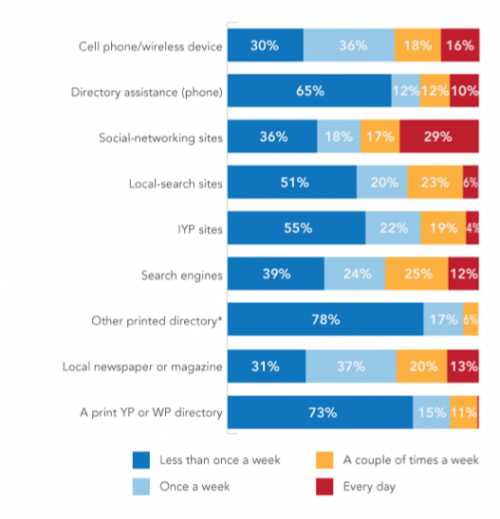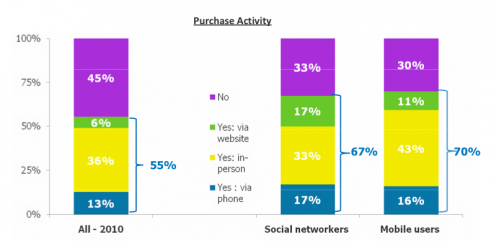Report: Local Search Users Better Prospects, But Market Complex And Fragmented
Anyone who cares about “local search” should pay attention. Yesterday at SMX East Agency TMP Directional Marketing/15Miles and comScore released their fourth annual Local Search Usage Study. A veritable cornucopia of data, the study continues to document the migration of local business lookups from traditional media to online. But the data also show the growing […]
Anyone who cares about “local search” should pay attention. Yesterday at SMX East Agency TMP Directional Marketing/15Miles and comScore released their fourth annual Local Search Usage Study. A veritable cornucopia of data, the study continues to document the migration of local business lookups from traditional media to online. But the data also show the growing importance of social media and the rise of mobile, as well as the continuing fragmentation of audiences in the local space.
There’s a great deal of information in the report, more than I’m able to present in this brief post. However I’ll hit some of the highlights.
The study combined behavioral observation of people on comScore’s panel with a follow-up survey (July, 2010) that produced roughly 4,000 completed responses. Here are the big trends (and prescriptions) presented in the report:
- Online search is the preferred method for information about local businesses
- Search engines are most popular, but they’re not growing as fast as other media
- Local searchers possess more potential in terms of post-search activities (local searchers are more apt to buy)
- An incomplete search presence won’t complete the sale (more information in more places is better)
- To develop a complete search presence, local businesses must consider every avenue (market continues to fragment)
- Print is declining, but it still holds value for today’s consumers (print now a strong “secondary” channel)
- With emerging media on the rise, a diverse media mix must now include social and mobile marketing
The following chart reflects three years of data showing how consumers’ “primary source” for local business information has changed.
Primary source for local business information
Source: TMPDM-comScore (n=4,000)
Search engines and Internet yellow pages sites have continued their usage gains at the expense of print. But these findings also show the emergence of mobile and social sites as fast-growing sources for local information, although with a much smaller share of the market.
This year’s report doesn’t expose a chart showing local search market share by site/publisher. However the narrative indicates that Google dominates local, with a 41 percent share of local search queries.
One of the other interesting findings is that print (yellow pages here) has stabilized as a strong “secondary” source for many of these respondents. According to the report:
As proof that print media is more effective when combined with other media, 44 percent of those who consult search engines use print directories as secondary sources, compared to 52 percent for IYP sites, 42 percent for directory assistance and 38 percent for local-search sites.
Not that this will be a surprise to anyone reading this blog, but social media (mainly Facebook) is increasingly important as a marketing platform, including in the local space. Of all the media categories examined in the study social media have the greatest usage frequency, with 46 percent of respondents saying they visit social sites at least a couple times a week to daily. The daily number for search engines was 12 percent, while it was 29 percent for social media.
Usage frequency of media types in local
Source: TMPDM-comScore (n=4,000)
Respondents appear to value the information depth and potential interaction that social media offer with companies and their products and services. Indeed, these respondents want to engage and interact with local businesses on social sites:
- 81 percent of social networkers believe that it is important for local businesses to respond to questions and complaints on social sites
- 78 percent want special offers, promotions and information about events
- 74 percent place importance on regular posts about products
- 72 percent value regular posts about companies
- 66 percent want company photos
The data above represent an opportunity but also a major challenge for local businesses, which often don’t have the time to invest in doing social media properly. On Screenwerk I discussed a recent VistaPrint survey in which one of the key findings was that small businesses would use social media more if they had more time. To respond to this “time gap,” many third party marketing firms, including TMPDM/15Miles are starting to manage social media on behalf of clients.
Finally, as mentioned, mobile continues to grow in importance in the local realm.
Coming out of SMX Advanced earlier this year and by now widely repeated is the Microsoft statistic that 70 percent of mobile search users initiate and complete a search session within an hour (compared to a week for 70 percent of PC users). The immediacy of the need and the focused intent of many mobile consumers makes them more valuable than PC search users.
This general idea is validated by the TMPDM-comScore research, which found that social media and mobile users are more likely to make a purchase than general search users.
Post search purchase behavior
Source: TMPDM-comScore (n=4,000)
There’s a good deal more detail and nuance in the study. However here’s my basic summary of the report’s big takeaways:
- Local searchers are more ready to buy than other types of searchers and thus highly valuable prospects
- Local consumer usage is increasingly fragmented across a range of sources (online, traditional media, mobile and social) so marketers must have a presence in each place
- Social and mobile media should not and cannot be neglected because of their growing importance in local
Contributing authors are invited to create content for Search Engine Land and are chosen for their expertise and contribution to the search community. Our contributors work under the oversight of the editorial staff and contributions are checked for quality and relevance to our readers. The opinions they express are their own.
Related stories
New on Search Engine Land


